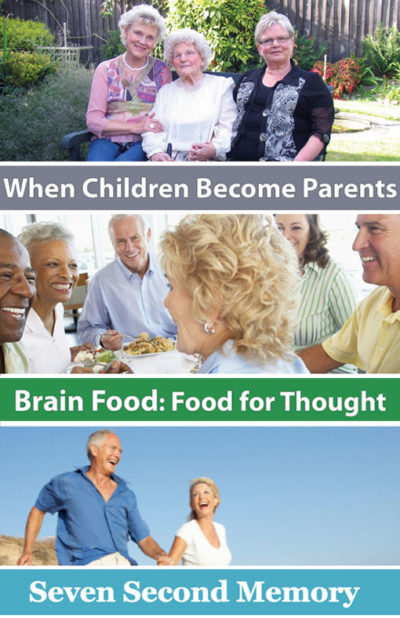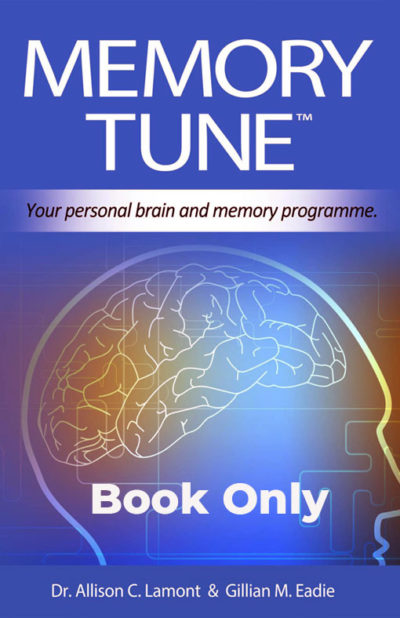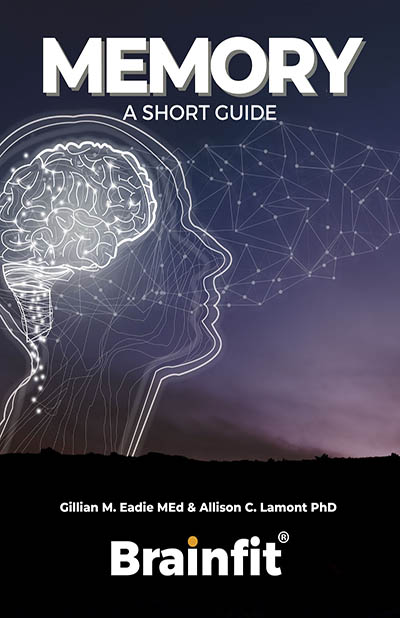Memory and memory loss in is the news a lot these days.
As a Brain Tuner, you know more than most!
But there are SO many myths and old wives’ tales about memory and the brain out there.
It CAN get confusing!
Give yourself this quick test.
Are the following statements True or False?
1. My brain’s like a database with files to store each memory.
True or False?
False. Memory has multiple systems that work together to encode, store, and retrieve your memories. Different parts of your brain specialize in particular types of memory. For example, the left temporal lobe is adapted to remember verbal information, one strip of the frontal lobe processes information about movement, and the occipital lobes process visual information. The brain is far too complicated to store all your memories in one place!
2. I can lose my memory.
True or False?
False. Memory is not an object you can lose. Rather, it is a set of abilities that can get out of shape or be sharpened. The more ways you can learn to help your memory store information, the easier it will be to remember later.
3. My brain is working fine at the moment so I don’t need to worry yet.
True or False?
False. Challenging and exercising your brain at any age is a bit like servicing your car: adding petrol, changing the oil, aerating tyres and having it checked regularly. Paying attention to your brain and memory boosts performance, strengthens neural pathways, stimulates the growth of brain cells and enables you to perform at peak for longer.
4. My memories are like photographs, accurate in every detail.
True or False?
False. Memories are not like a camera shot because everything that has happened to you during the time lapse since the experience will colour and change the memory. Even the mood you were in at the time will affect how you will remember the occasion. Our perspectives are always changing. Have you ever returned to a house you lived in when you were very small? When you return as an adult you’ll be surprised at how small the house is – when you were a child it seemed enormous! The house hasn’t changed, but your perspective has.
5. Not remembering being a very small child is a sign of memory loss.
True or False?
False. Many people think there is something wrong with them because they can’t remember anything until they were about four years of age, and even then the memories are fragmented. Often your earliest memories are tiny fragments of a face, perhaps special clothing, or just feel like impressions. In early childhood the brain is just developing and being ‘wired’ to be able to formulate and store memories. Because the first part of the brain to develop is associated with your senses, the first connections you made were linking the senses. The brain parts concerned with higher thinking take many years to develop and this process doesn’t finish until late adolescence. It is no surprise, then, that you can’t remember your first two or three years.
6. We will all lose our memory in old age.
True or False?
Not necessarily! The answer depends on you! Ageing universally affects all organs so there are some changes in memory and the brain as you get older. It is true you lose neurons with age. It is also true the risk of Alzheimer’s increases with age. However, a well-trained memory is resilient and shows comparatively fewer functional signs of ageing than the heart, the joints and the vascular system. Neuroscience shows that neurons can regrow until the end of life, if there is something for them to do. Older people do not show memory decline at the same rate. An active lifestyle, mental and physical challenges and a healthy diet will make a difference to the way your brain ages.
7. I can learn in my sleep.
True or False?
False.There have been many companies which sell audio CDs which are supposed to allow you to learn while you sleep. The idea is that you play the CD while you sleep and you will miraculously absorb the information. The truth is, when researched, the only way the sleepers learned was because the sounds woke them up! An important component of effective learning is paying attention. Reading or studying while you are awake will bring much better results.
8. I feel pain immediately when I burn my finger.
True or False?
False. There is a delay between burning a finger and the time you feel the actual pain. This happens because different types of nerves carry information at different speeds. The initial touch flies along a thick nerve at more than 250 miles an hour. The actual sensation of pain is carried along thinner, slower nerves.
9. My genes determine the fate of my brain.
True or False?
False. Your brain has the extraordinary ability to modify its own structure and function in response to changes within the body or in the external environment. This ‘brain plasticity’ is lifelong and means that your lifestyle and behaviour play a significant role in how your brain (and therefore your mind) physically evolves.
10. With memory, it is ‘use it or lose it’.
True or False?
True. People who ensure they have rich, active lives show much less decline in both memory and thinking abilities. Many older people outperform much younger people in mental abilities, including memory. The old adage “Use it or lose it” definitely applies to memory.
11. Brain training is all about video games.
True or False?
False. Real, evidence-based brain training includes cognitive training (exercises designed to improve memory skills, attention, perception, reasoning, planning, judgement, general learning, and overall executive functioning). Interactive media such as video-games (or neurogames) can make those interventions more engaging, but not all videogames are the same. Look for games which exercise your short-term memory and working memory while giving you time to work at your own pace. You will find ideal games, with these qualities built in, at
Memory Foundation
12. At 60 or 70 I am too old to improve my memory.
True or False?
False. Definitely not – the success you experience will depend upon what you do. I love the quotation from Virgil that was repeated in Jonathan Livingston Seagull: “They can because they think they can”. Isn’t that a wonderful way to live your life? With a positive, can-do attitude, and your natural curiosity and enthusiasm for engaging in new experiences, you will restore your youthful memory and probably outperform yourself at 50!
Have you bought your copy of 7-Day Brain Boost Plan yet? Sold out of its second edition, this best seller is now available and will give you the answers you need! Here is Gillian Eadie being interviewed on Breakfast, with Rawdon Christie from TVNZ.

Were any of these True/false answers a surprise? Or do you have an example of how one works for you? Please leave a comment to share with others.
For more free help and personal advice on how your brain works and improving your memory, check other articles Memory.Foundation. Or Contact Us. We’d love to hear from you and we always answer queries.






